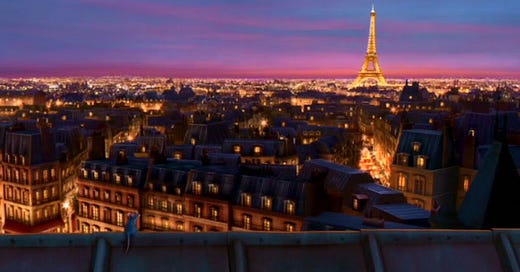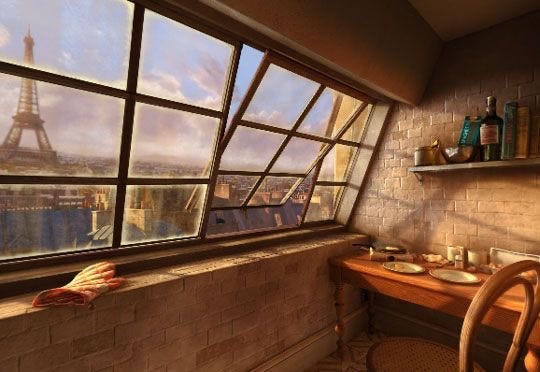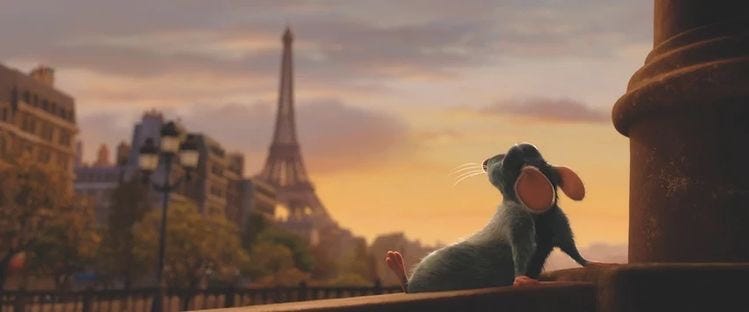so i wrote this for my ENGL 121 class so not exactly a Swimming Pool Thought but i had fun with parts of it hehe
Ratatouille’s Paris is a dream world. At sunset, the sky glows with the memory of day between billows of periwinkle clouds; night is a deep purple above the golden lights of the city.
The movie’s main character, Remy, is a rat from the French countryside. When he first climbs out of the sewers and rafters and scurries up a roof, the music swells as he sees the city spread out before him—boulevards and mansard roofs, bridges over the Seine and the silhouettes of cathedral spires, windows and streetlights like constellations beneath a purpling sky. The Eiffel tower shines in the distance.
“All this time I’ve been underneath Paris?” he asks, awe-struck.
Most of the film’s settings pretend to be pedestrian, forgotten perspectives of the city—yet still helplessly radiant, unable to hide the innate beauty of Paris. The sewers that bring Remy to Paris are the dramatic rapids of an underworld river, pulled straight from Les Misérables. The kitchen where most of the film takes place is a world of creamy tile and brass pots and pans, rosy and sunkissed. The film’s main human character, Alfredo Linguini, a garbage boy as white and wobbly as the dish he’s named for, can’t hold a job—but even his dingey, bedroom-less apartment is romantically sparse, with the exposed brick American millennials crave and a skyline view of Paris.
Remy is voiced by Patton Oswald, a comedian known for his roles in sitcoms like The King of Queens and The Goldbergs. Alfredo Linguini is voiced by Lou Romano, who voices Dash’s teacher in Incredibles and Snot Rod in Cars. These actors are not known for sexy, cosmopolitan roles. And yet even their characters are heroes in this beautiful world of Paris.
As a child who had never known a place beyond sleepy, dreamless mid-atlantic suburbs and a tiny town in Texas, I was convinced that even struggling in France was more beautiful than succeeding in the United States.
But Ratatouille (2007) is hardly French. Although the team did extensive research on Paris’s chefs and kitchens, and the film was well received in France, none of the voice actors are French.
And Ratatouille’s plot is the classic American story of rags-to-riches, a gifted dreamer rising to unexpected success. Remy is a rat from the countryside, gifted with an extraordinary sense of taste and in love with the elite, human world of the culinary arts. He idolizes Gusteau, a human chef he saw on television, and clashes with his father, Django, a rat with a Brooklyn accent and a justified fear of humans.
When an encounter with humans forces Remy’s family to evacuate from the countryside, they rush to the sewers. Remy is separated from the clan—but finds himself in Paris, where he ventures into the late Chef Gusteau’s restaurant and forms an alliance with Linguini. Linguini is secretly Gusteau’s son, but he has no skill or training; Remy, meanwhile, is a talented rat. By hiding in Linguini’s toque and controlling his movements by pulling his hair, the two masquerade as a human culinary genius.
The movie’s core tenet, “anyone can cook,” is synonymous with the American belief that anyone can succeed with passion and hard work. A rat—a member of the literal underclass of Paris, belonging in the sewers not the kitchens—can impress the most feared critic in Paris. No matter where you come from or what’s stacked against you, you can “make it.”
Even though Ratatouille is a retelling of the core American myth, the story simply has to be in perfect, gorgeous, dreamy Paris. Americans still view Paris as the cultural capital of the world. To be Parisian is to be effortlessly elegant, to live in perpetual candlelight and sunsets, to hold a glass of infinite champagne and walk spotless cobblestone streets, to stroll the Louvre and kiss beneath the Eiffel tower and buy baguettes in sunny cafes. Paris is the height of art and food. So for a rat to earn the praise of Paris, to ascend from the sewers to Michelin stardom, is the epitome of the American dream.
And, for my generation, Ratatouille’s Paris is a place where we still believe dreams can come true. Ratatouille was released in 2007—one year before a global financial crisis. Ten years before I was a high schooler listening to the Ratatouille soundtrack and worrying over an Astronomy midterm, not needing statistics about social mobility to believe that my GPA and SAT were the only way I’d earn a life where people went to art museums and drank wine. Thirteen years before 2020: when George Floyd’s death sparked a national reckoning with race and injustice, and COVID-19 brought social isolation, unprecedented death, and a global economic slowdown—and then a contested election shook our remaining faith in our nation’s ideals.
My generation can’t believe in a world where “anyone can cook.” We know that hard work isn’t a guarantee of success. Dreams don’t come true—at least, not in the real, dirty, American world of highways and railroads and coal and steel. With its message about making it as an artist in the big city, Ratatouille could be a New York story—but would we watch a movie about a New York rat?
Sixteen years later, Ratatouille remains a beloved film because “making it” is the illusion we still crave, and this idealized Paris gives us hope. In 2021, TikTokers made a crowd-sourced Ratatouille musical, and the movie was referenced in the film Everything Everywhere All At Once (2022) which won the Oscar for Best Picture this year.
In the end, however, even Parisian dreams fall apart. The day after earning Ego’s approval, Gusteau’s closes because of the rat infestation.
Ratatouille ends with “Le Festin,” (“The Feast”) the contemporary French singer Camille’s hymn of heartbroken hope, a song with the radiant faith of someone who has been shattered and yet still dreams: “Lovers' dreams are like fine wine/They give joy or sorrow,” Camille begins; the singer finds herself weakened by hunger, a lonely thief used to skipping meals, stealing because nothing in life is free. She’s on the run, just scraping by.
But she refuses to believe “That the race to the stars/is not for me.” She sets the table for a new life, “happy at the idea of a new destiny.” As Camille sings, the audience learns that Remy, Linguini, and Collete achieve a new dream: opening their own restaurant.
Ratatouille was the first movie Disney made after buying Pixar for $7.4 billion dollars in 2007. In our era of entertainment monopolies, do we still have hope for the untrained, unexpected artist?
“Le Festin” proposes that perhaps our dreams do fail, but we can find better ones. The song is a joyful, hopeful response to defeat, a song of resistance, a belief that “the feast is on my path,” better times are coming. And maybe we won’t have five stars and a name that shines over Paris, but we can learn to love our smaller dreams.
And maybe in Paris—where sunrise smells like fresh bread and the streets are always quiet and there's always cafes and wine and someone to love—maybe here, small dreams are enough.






